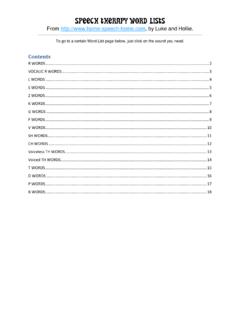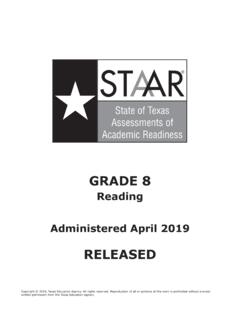Transcription of Year 8 Dystopian Fiction Home Learning Booklet
1 0 Year 8 Dystopian Fiction Home Learning Booklet 1 Week One: What is Dystopian Fiction ? Dystopian Fiction / Films: Can you think of any books or films that are set in a Dystopian society? Fiction (Books): Films: The Hunger Games 1984 The Hunger Games I Am Legend Utopia = an imagined place or society in which everything is perfect. Dystopia = an imagined place or society in which there is great suffering or injustice. Post-apocalyptic = the time following a catastrophic event where they majority of the human race is wiped out and the world is changed dramatically, nuclear war, zombie invasion, etc. Dystopian Fiction = made-up (not true) stories about societies where there are problems with things like government rules, poverty, or oppression; sometimes set in a post-apocalyptic world. 2 STATEMENT 1: _____ _____ I AGREE / DISAGREE BECAUSE: _____ _____ _____ _____ TASK: Tick AGREE or DISAGREE next to each statement in the table below.
2 Pick TWO of the statements and explain why you agree or disagree with them. STATEMENT 2: _____ _____ I AGREE / DISAGREE BECAUSE: _____ _____ _____ _____ 3 Dystopian Elements and Characteristics: Basic Building Blocks of Dystopian Fiction Dystopia is subgenre of science Fiction , because it depicts future fictional societies, and many of them use other elements of science Fiction like time travel, space flight, amazing and advanced technologies, etc. Dystopian stories are often about survival; their primary theme is oppression and rebellion. The environment plays an important role in Dystopian Fiction . Dystopian stories take place in the future; usually in large cities devastated by pollution, war, revolutions, overpopulation and other disasters. Another characteristic of Dystopian Fiction is a strict division between the people or characters. This may be a separation by intellect, ability or class. In a typical dystopia, there is a strict government or leader who controls everything.
3 There is also usually a protagonist (main character) who questions society, often feeling that something is terribly wrong and tries to change it. Watch this short video called How to recognise a dystopia and make notes. - look out for examples of dystopias - what influences writers to create Dystopian Fiction ? TASKS: 1. Read the information in the box above and watch the video clip (if you have internet access). What are the key features or characteristics of Dystopian Fiction ? Create a bullet point list with as many details as possible: 4 2. Think of a Dystopian novel or film that you know of. Which key features / characteristics do they show? If you don t know any Dystopian novels or films, try researching them online or look at the pictures below to give you inspiration. Novel or film name: _____ Key features or characteristics of Dystopian Fiction : _____ _____ _____ _____ _____ _____ _____ 3.
4 Create a Dystopian fact-file outlining how and why it is a good exemplar of this genre. Include: - plot summary - main characters - key features and characteristics of Dystopian Fiction - reviews from readers and commentaries from experts - your personal opinion 5 6 Reading an example of Dystopian Fiction Extract from Chapter One of 1984 by George Orwell Overview and extra reading available here. Summary of the entire novel is available here. 6It was a bright cold day in April, and the clocks were striking thirteen. Winston Smith, his chin nuzzled into his chest in an effort to escape the vile wind, slipped quickly through the glass doors of Victory Mansions, though not quickly enough to prevent a swirl of gritty dust from entering along with him. The hallway smelt of boiled cabbage and old rag mats. At one end of it a coloured poster, too large for indoor display, had been tacked to the wall. It depicted simply an enormous face, more than a metre wide: the face of a man of about forty-five, with a heavy black moustache and ruggedly handsome features.
5 Winston made for the stairs. It was no use trying the lift. Even at the best of times it was seldom working, and at present the electric current was cut off during daylight hours. This was part of the economy drive in preparation for Hate Week. The flat was seven flights up and Winston, who was thirty-nine and had a varicose ulcer above his right ankle, went slowly, resting several times on the way. On each landing, opposite the lift shaft, the poster with the enormous face gazed from the wall. It was one of those pictures which are so contrived that the eyes follow you about when you move. BIG BROTHER IS WATCHING YOU, the caption beneath it ran. Inside the flat a fruity voice was reading out a list of figures which had something to do with the production of pig-iron. The voice came from an oblong metal plaque like a dulled mirror which formed part of the surface of the right-hand wall. Winston turned a switch and the voice sank somewhat, though the words were still distinguishable.
6 The device (a telescreen, it was called) could be dimmed, but there was no way of switching it off completely. He moved over to the window: a smallish, frail figure, the thinness of his body merely emphasised by the blue overalls which were the uniform of the Party. His hair was very fair, his face naturally ruddy, his skin roughened by coarse soap and blunt razor blades and the cold of the winter that had just ended. Outside, even through the shut window-pane, the world looked cold. Down in the street little eddies of wind were whirling dust and torn paper into spirals, and though the sun was shining and the sky a harsh blue, there seemed to be no colour in anything, except the posters that were plastered everywhere. The black-moustachio d face gazed down from every commanding corner. There was one on the house-front immediately opposite. BIG BROTHER IS WATCHING YOU, the caption said, while the dark eyes looked deep into Winston s own.
7 Down at street level another poster, torn at one corner, flapped fitfully in the wind, alternately covering and uncovering the single word INGSOC. In the far distance a helicopter skimmed down between the roofs, hovered for an instant like a bluebottle, and darted away with a curving 7 flight. It was a police patrol, snooping into people s windows. The patrols did not matter, however. Only the Thought Police mattered. Winston looked out of his window towards a huge building several kilometres away. The Ministry of Truth was startlingly different from any other object in sight. It was an enormous pyramidal structure of glittering white concrete, soaring up, terrace after terrace, three hundred metres into the air. From where Winston stood it was just possible to read, picked out on its white face in elegant lettering, the three slogans of the Party: WAR IS PEACE. FREEDOM IS SLAVERY. IGNORANCE IS STRENGTH. The Ministry of Truth contained, it was said, three thousand rooms above ground level and similar numbers below.
8 Scattered about London there were just three other buildings of similar appearance and size. So completely did they dwarf the surrounding buildings that from the roof of Victory Mansions you could see all four of them simultaneously. They were the homes of the four Ministries between which the entire government was divided. The Ministry of Truth which concerned itself with news, entertainment, education and the fine arts. The Ministry of Peace which concerned itself with war. The Ministry of Love which maintained law and order. And the Ministry of Plenty which was responsible for economic affairs. Their names, in Newspeak: Minitrue, Minipax, Miniluv and Miniplenty. The Ministry of Love was the really frightening one. There were no windows in it at all. Winston had never been inside the Ministry of Love, nor within half a kilometre of it. It was a place impossible to enter except on official business, and then only by penetrating through a maze of barbed-wire entanglements, steel doors and hidden machine-gun nests.
9 Even the streets leading up to its outer barriers were roamed by gorilla-faced in black uniforms, armed with jointed truncheons. TASKS: 1. Read the extract from 1984 (above). 2. Highlight / underline any parts that show you this novel is set in a Dystopian society. 3. Write one of the quotes you have highlighted / underlined here and explain what is suggests about the type of society Winston is living in: QUOTE: _____ This suggests that _____ _____ _____ _____ _____ 8 4. Identify five key features or conventions of Dystopian Fiction in this extract: CHALLENGE: Include a quote from the extract for each. 5. A student read the extract from 1984 and said: The society in which Winston lives sounds pleasant and friendly. To what extent do you agree? In your answer, you should: - state whether you agree or disagree with the statement and explain why - include evidence (quotes) from the extract to support your opinion - explain what each quote tells the reader about the society Winston lives in - pick out some individual words or techniques used by the writer and explain their effect - include your personal opinion would you like to live there?
10 Why, or why not? AIM TO WRITE AT LEAST ONE PEE PARAGRAPH (you may need to use extra paper). _____ _____ _____ _____ _____ _____ _____ _____ _____ _____ _____ _____ _____ _____ 9 Week Two: Setting in Dystopian Fiction The choice of setting is extremely important in a Dystopian novel. Remember, a dystopia is a place where normal life is different to how we know it: post-apocalyptic, perhaps after a nuclear war or a world-wide pandemic/disease; an extreme famine or starvation; an alien invasion; a society where the government or single leader has total control; etc. A writer s choice of setting can almost act as another character in a Dystopian novel; it helps create an expectation or impression for the reader of what might happen to the protagonist (main character), or helps them to sympathise with the characters suffering. This week, you are going to look at some examples of Dystopian settings in Fiction . This will help you prepare for creating your own Dystopian setting next week.







